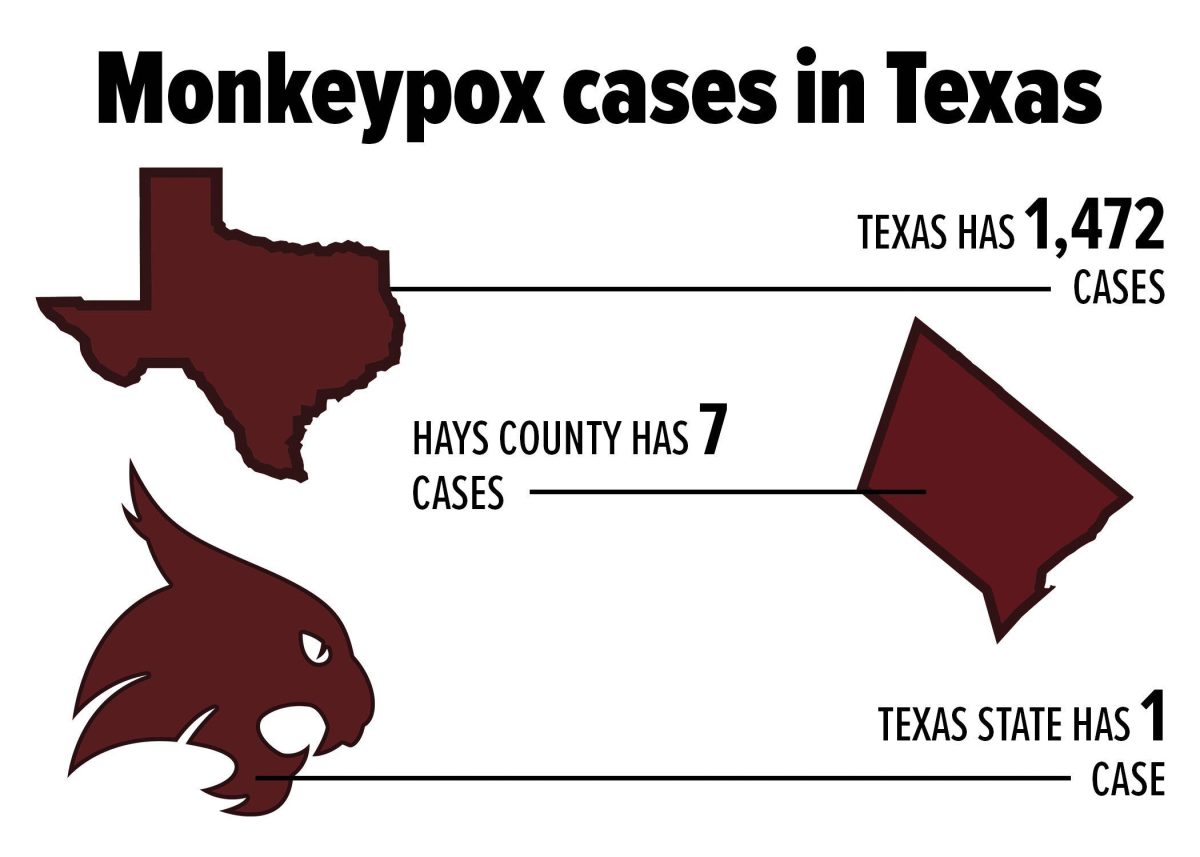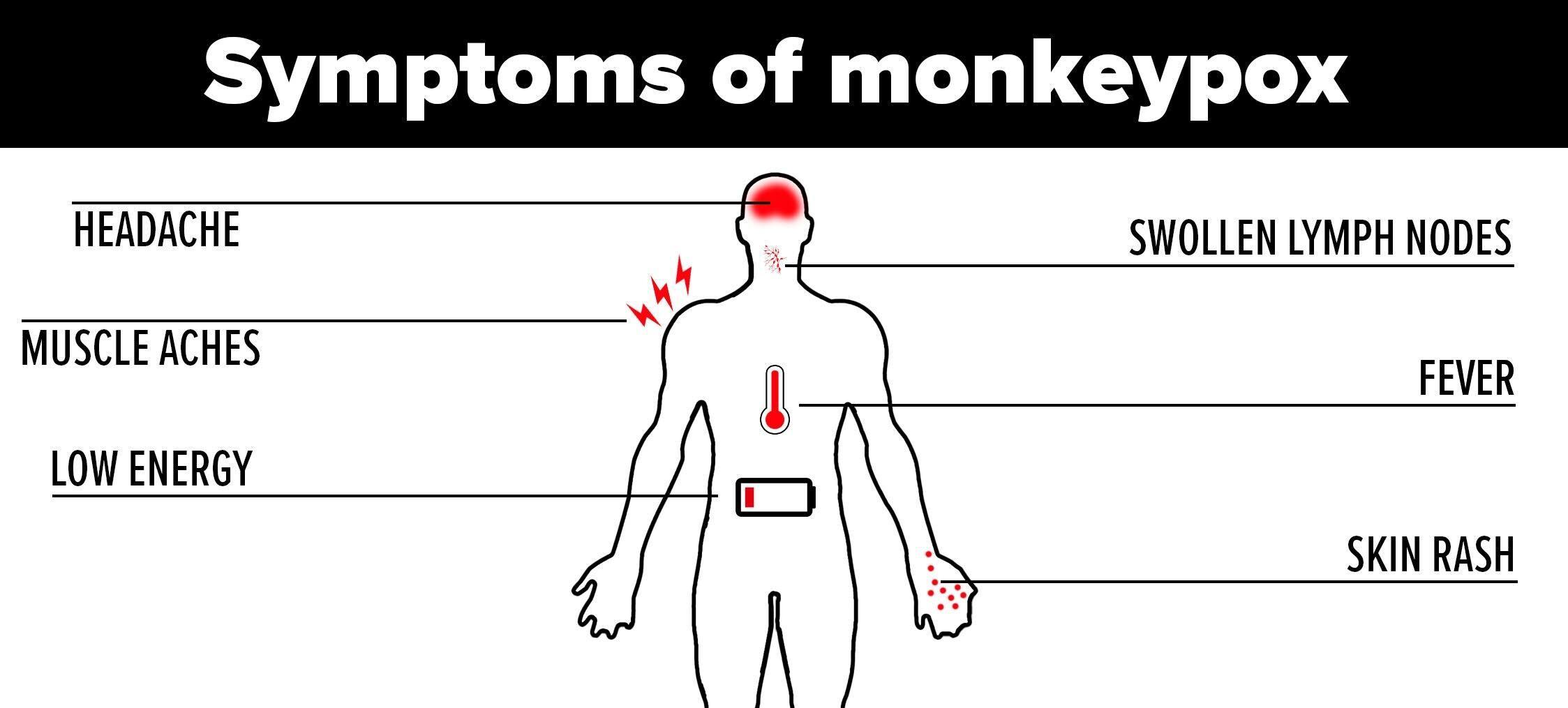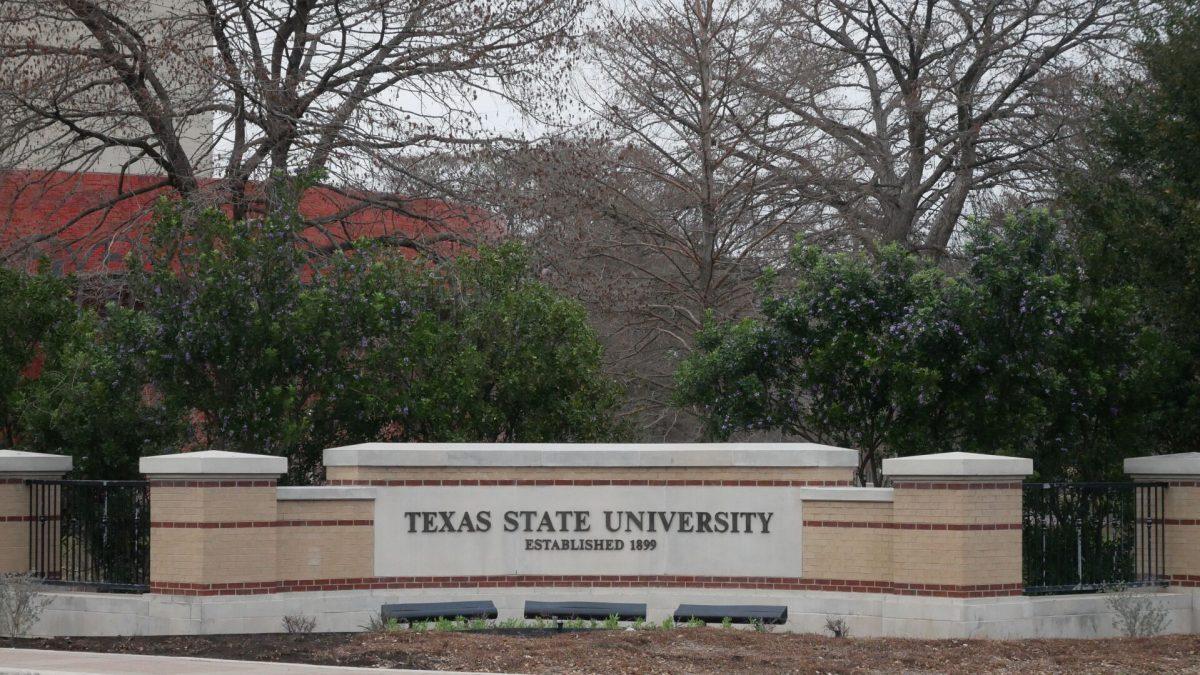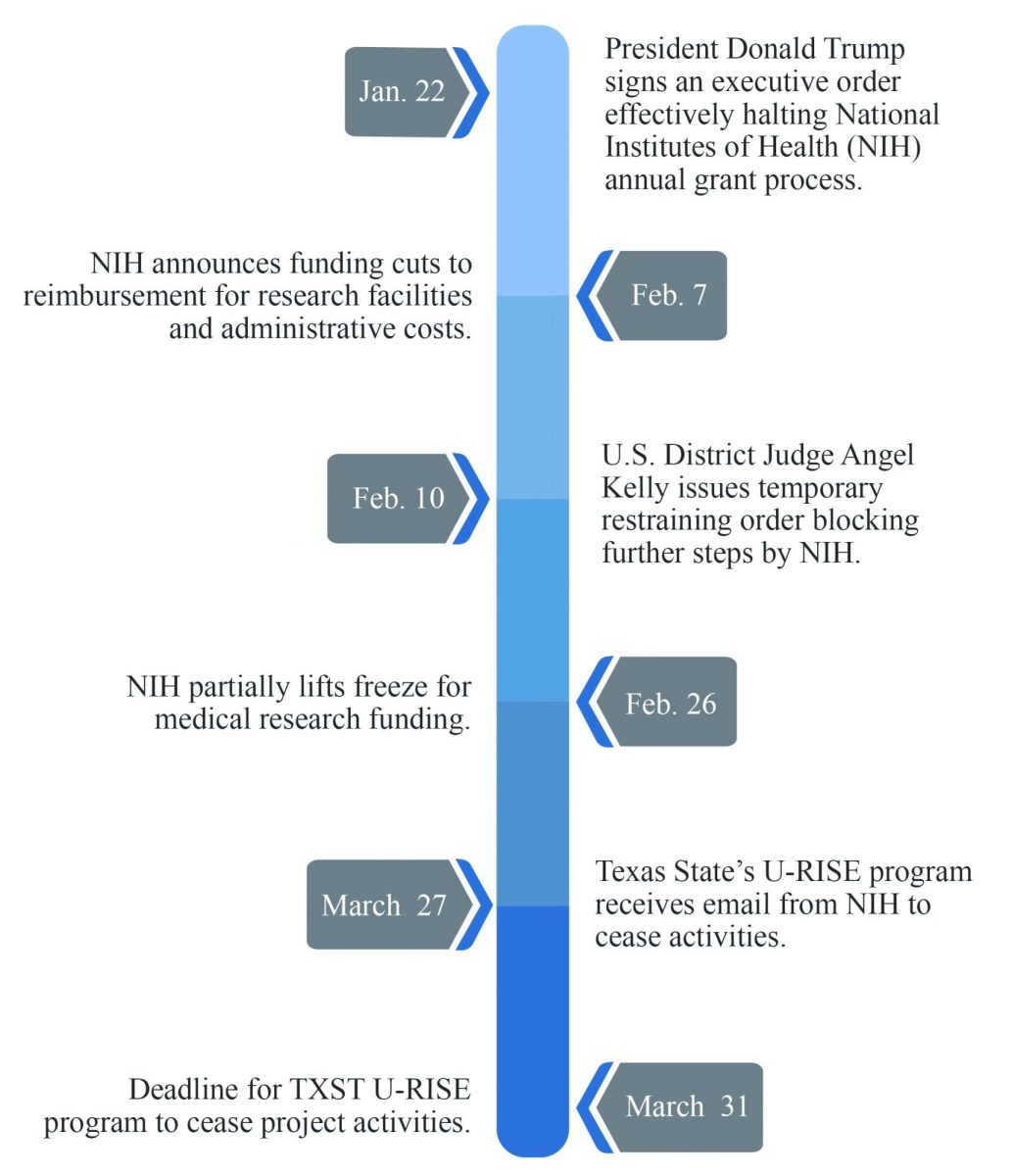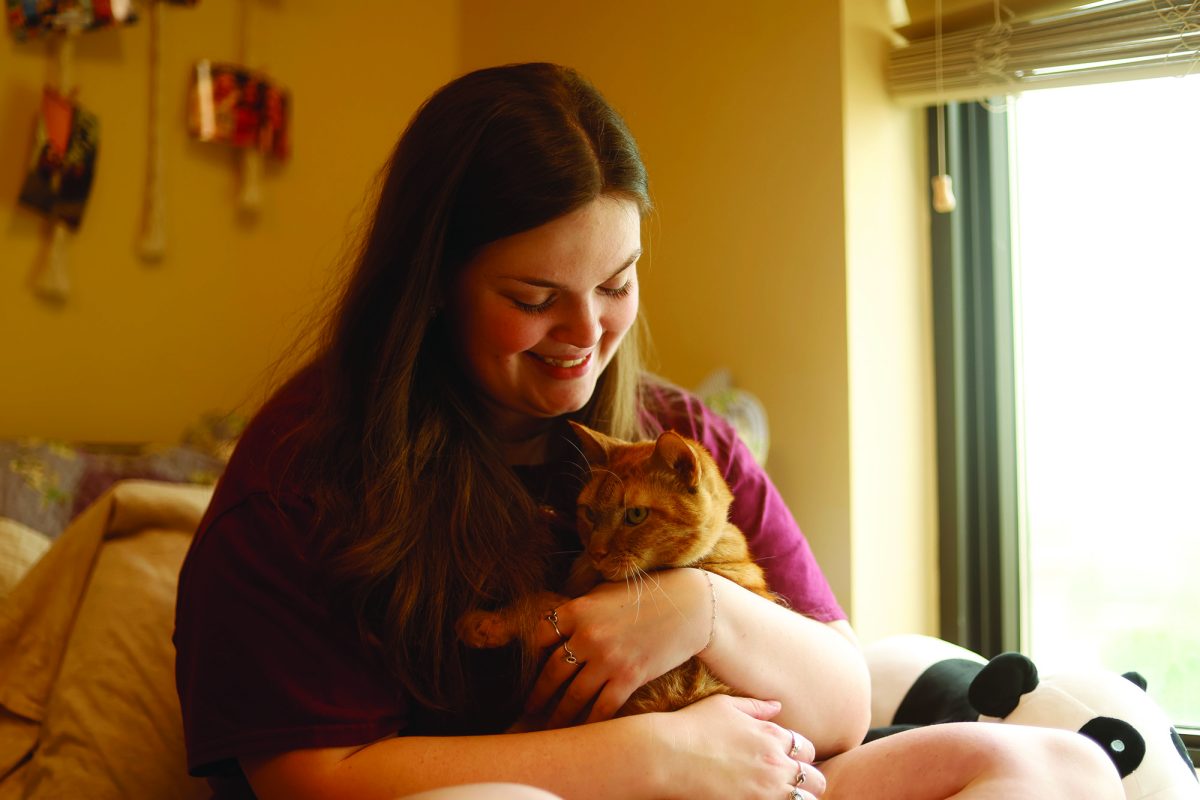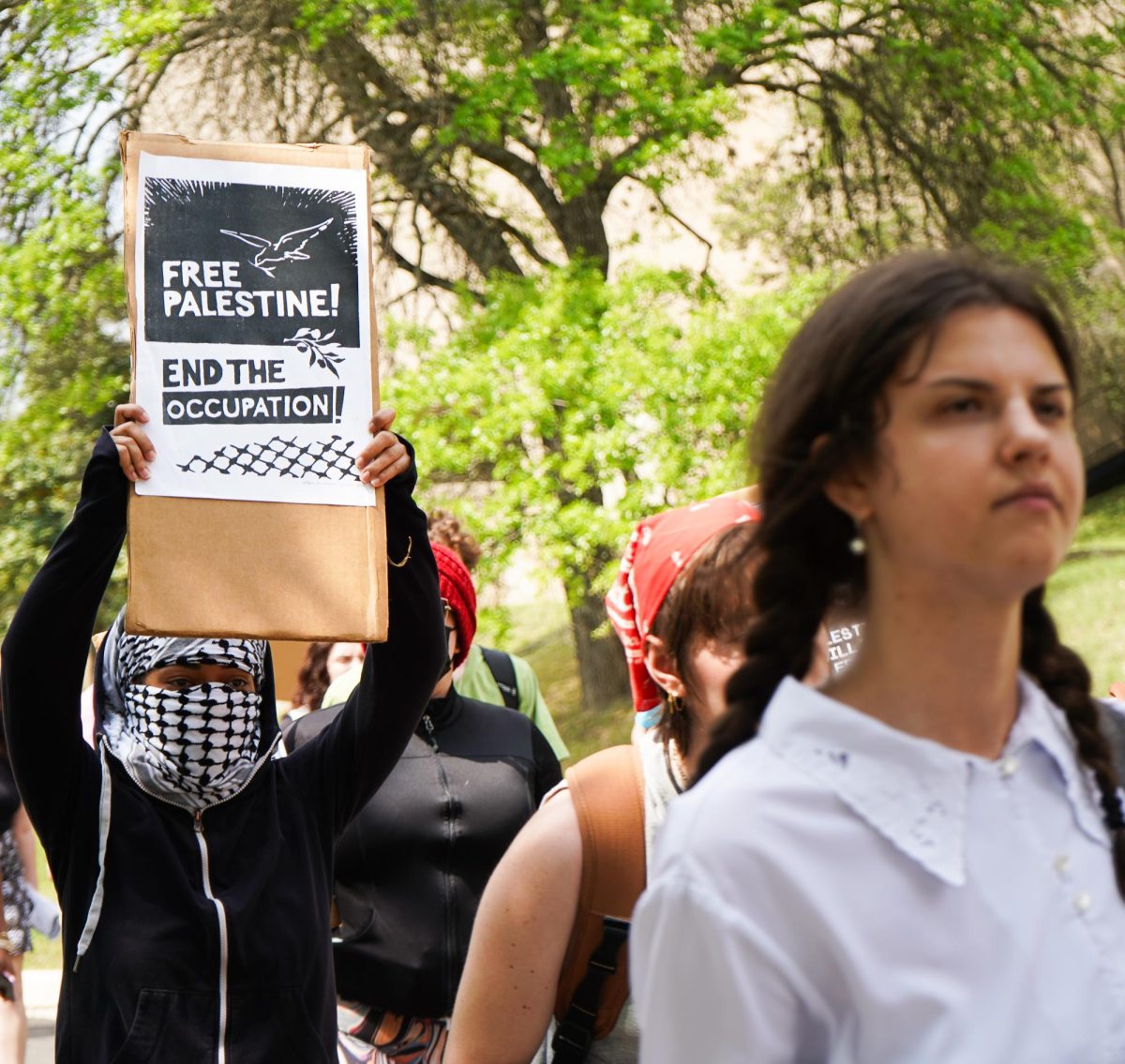Texas State announced its first confirmed case of monkeypox on August 23, raising mixed emotions among students about the upcoming school year.
As of last Tuesday, the Texas State campus has been buzzing with questions surrounding the individual who tested positive for monkeypox. How this infectious disease could potentially affect the university is an objective school staff is working toward addressing.
Texas State Chief Medical Officer Dr. Emilio Carranco is working with the Hays County Local Public Health Department to protect and inform students about the disease.
“Our job is to make sure that anyone who is infected in our community understands how to properly isolate so we can identify close contacts as quickly as possible,” Carranco said. “Being aware of symptoms, getting tested as soon as there’s a concern, isolating yourself from others until you know for sure what’s happening and wearing a mask are all things students should be doing.”
Students like Alexis Runnels, a wildlife biology junior, have no understanding of Texas State’s current plan regarding outbreaks.
“I would say I’m slightly concerned. I know a lot of people have various beliefs on its origin and really I would need to get more educated on the matter myself. But I am a little concerned on how Texas State is going to address it,” Runnels said.
According to the Centers for Disease Control and Prevention (CDC), the main cause of monkeypox transmission is close skin-to-skin contact, primarily through intimate activities. Carranco said the disease can take anywhere from two to four weeks to run its course, making it even more crucial to isolate and get tested immediately if symptoms appear.
“We have what we call negative pressure examination rooms that allow us to evaluate people with contagious diseases in a way that reduces our risk of exposure,” Carranco said. “So we are prepared at the Student Health Center should we see any sort of case and a lot of preparation occurred before that first case was ever reported.”
Other forms of preparation the university is taking include conversations with housing and staff on symptom evaluation, isolation and general awareness of all infectious diseases including monkeypox and COVID-19. A new monkeypox webpage has also been created on the Student Health Center website that students can visit to get additional information.
Sheila Abdul, a nursing junior, worries about how monkeypox will be handled based on the university’s past actions regarding the COVID-19 pandemic.
“I bet you half the kids on campus don’t even know what it is and how it spreads,” Abdul said. “I feel like instead of informing us they’re kind of just gonna treat it like COVID and wait till the last minute to say we actually can’t come to school anymore if it does get to that point.”
Carranco expresses there is “no expectation of huge outbreaks.” Students like Abdul, however, have a deep-rooted fear that monkeypox will have the same effects on their college lives that COVID-19 did.
“I’m a little bit scared that it’s gonna be the new COVID just because of social media and other fear mongering going on,” Abdul said. “I’m trying to get all my going out of my system just in case anything happens and we have to shut down again.”
Shutting down the campus and reverting back to remote learning because of monkeypox is a step Carranco said the university does not foresee happening.
“I know students are concerned that they’re going to go through that experience again but at this time I would say that it’s very unlikely with either COVID or monkeypox,” Carranco said. “We’re all very hopeful that we’re going to have a fairly normal fall semester and that our students will be able to enjoy all the things they expect to enjoy at a university.”
There is a population of students who share Carranco’s hopeful sentiment like Kelly Standish, a business senior,
“With monkeypox, it’s probably going to be more manageable than COVID,” Standish said. “I don’t think it’s going to be as big of a deal since it’s only transferred through skin to skin or clothes and stuff so I think just checking yourself and taking care of yourself should be the key.”
An optimistic yet cautious approach to dealing with monkeypox on campus is what the university is aiming to convey to students this semester.
For additional information regarding monkeypox, visit the Hays County Local Health Department Monkeypox Information Hub, the Student Health Center monkeypox webpage or the Centers for Disease Control and Prevention website.
Texas State Chief Medical Officer Dr. Emilio Carranco is working with the Hays County Local Public Health Department to protect and inform students about the disease.
“Our job is to make sure that anyone who is infected in our community understands how to properly isolate so we can identify close contacts as quickly as possible,” Carranco said. “Being aware of symptoms, getting tested as soon as there’s a concern, isolating yourself from others until you know for sure what’s happening and wearing a mask are all things students should be doing.”
Students like Alexis Runnels, a wildlife biology junior, have no understanding of Texas State’s current plan regarding outbreaks.
“I would say I’m slightly concerned. I know a lot of people have various beliefs on its origin and really I would need to get more educated on the matter myself. But I am a little concerned on how Texas State is going to address it,” Runnels said.
According to the Centers for Disease Control and Prevention (CDC), the main cause of monkeypox transmission is close skin-to-skin contact, primarily through intimate activities. Carranco said the disease can take anywhere from two to four weeks to run its course, making it even more crucial to isolate and get tested immediately if symptoms appear.
“We have what we call negative pressure examination rooms that allow us to evaluate people with contagious diseases in a way that reduces our risk of exposure,” Carranco said. “So we are prepared at the Student Health Center should we see any sort of case and a lot of preparation occurred before that first case was ever reported.”
Other forms of preparation the university is taking include conversations with housing and staff on symptom evaluation, isolation and general awareness of all infectious diseases including monkeypox and COVID-19. A new monkeypox webpage has also been created on the Student Health Center website that students can visit to get additional information.
Sheila Abdul, a nursing junior, worries about how monkeypox will be handled based on the university’s past actions regarding the COVID-19 pandemic.
“I bet you half the kids on campus don’t even know what it is and how it spreads,” Abdul said. “I feel like instead of informing us they’re kind of just gonna treat it like COVID and wait till the last minute to say we actually can’t come to school anymore if it does get to that point.”
Carranco expresses there is “no expectation of huge outbreaks.” Students like Abdul, however, have a deep-rooted fear that monkeypox will have the same effects on their college lives that COVID-19 did.
“I’m a little bit scared that it’s gonna be the new COVID just because of social media and other fear mongering going on,” Abdul said. “I’m trying to get all my going out of my system just in case anything happens and we have to shut down again.”
Shutting down the campus and reverting back to remote learning because of monkeypox is a step Carranco said the university does not foresee happening.
“I know students are concerned that they’re going to go through that experience again but at this time I would say that it’s very unlikely with either COVID or monkeypox,” Carranco said. “We’re all very hopeful that we’re going to have a fairly normal fall semester and that our students will be able to enjoy all the things they expect to enjoy at a university.”
There is a population of students who share Carranco’s hopeful sentiment like Kelly Standish, a business senior,
“With monkeypox, it’s probably going to be more manageable than COVID,” Standish said. “I don’t think it’s going to be as big of a deal since it’s only transferred through skin to skin or clothes and stuff so I think just checking yourself and taking care of yourself should be the key.”
An optimistic yet cautious approach to dealing with monkeypox on campus is what the university is aiming to convey to students this semester.
For additional information regarding monkeypox, visit the Hays County Local Health Department Monkeypox Information Hub, the Student Health Center monkeypox webpage or the Centers for Disease Control and Prevention website.



